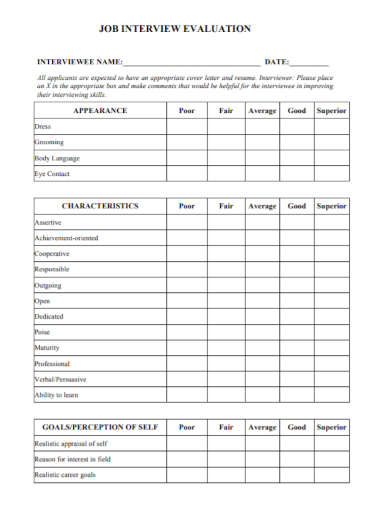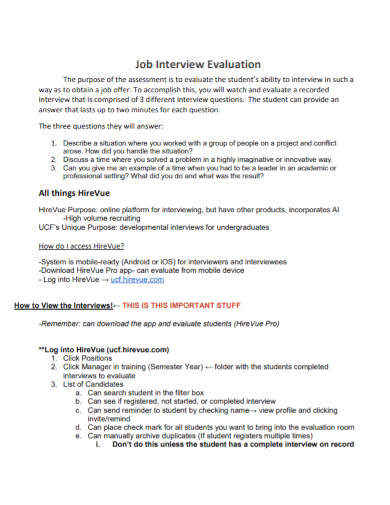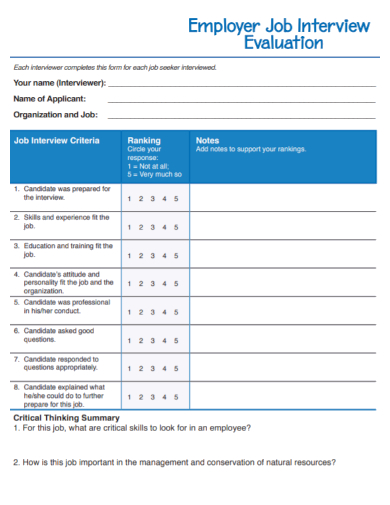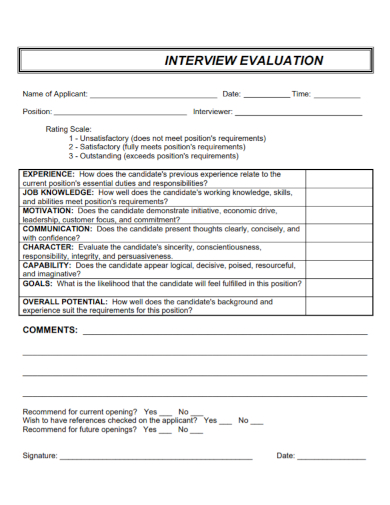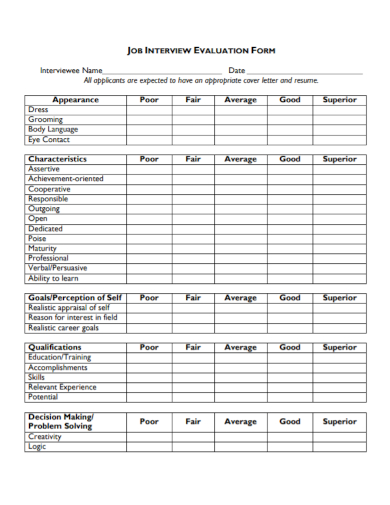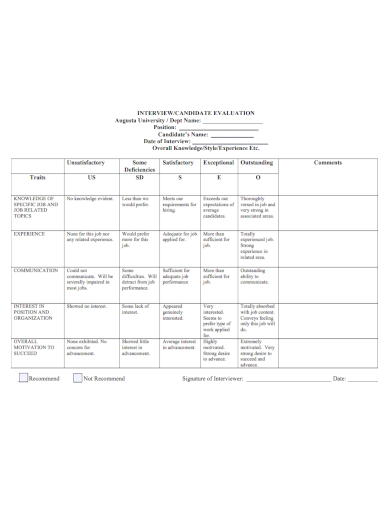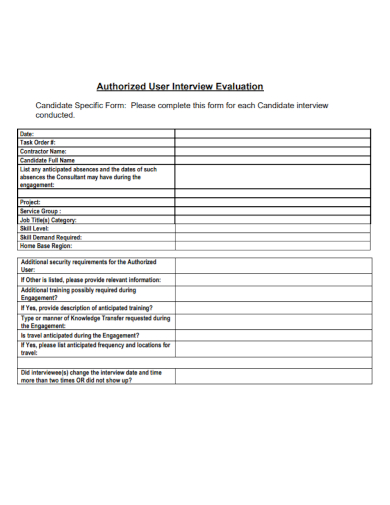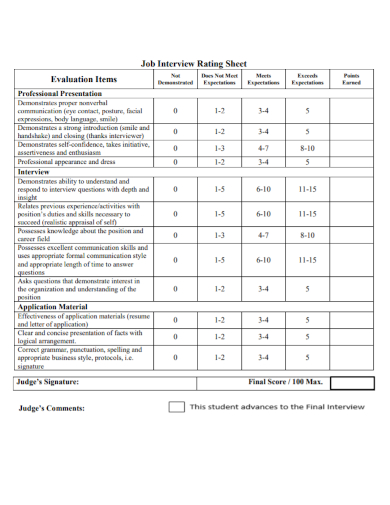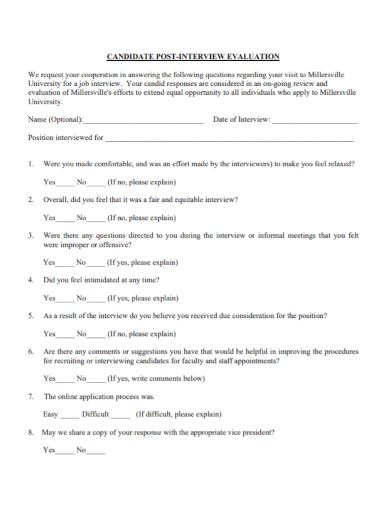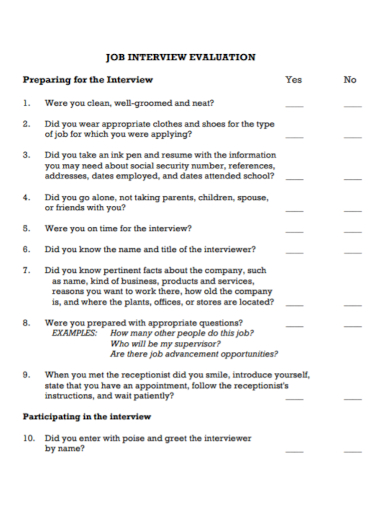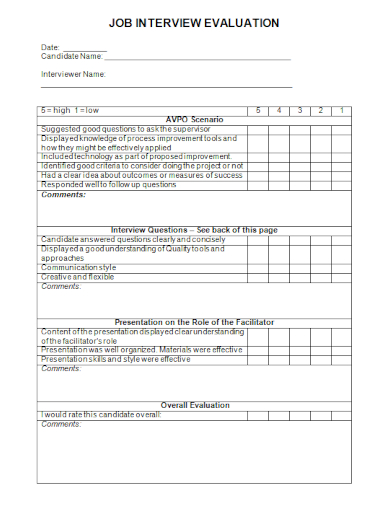Hiring new employees in a company can be tricky at times; hiring staff always has doubts whether they hired the perfect candidate for the job or they rejected a candidate that is way more qualified than the person they chose to hire. After all, interviews are only a glimpse of what the candidate really is and it doesn’t automatically reflect their work ethic. However, since the company does not have a lot of time and resources to closely monitor the candidate, they use their qualifications and the way present themselves and answers from the interview questions to evaluate the candidate objectively. To make sure that the interviewer can evaluate the candidate properly, the whole hiring staff are responsible to do it so they can unanimously make the final decision. This will help speed up the process of onboarding the candidate, and help reduce the hiring costs. This article will guide you on how to evaluate a job interview.
10+ Job Interview Evaluation Samples
1. Job Interview Evaluation
2. Sample Job Interview Evaluation
3. Employer Job Interview Evaluation
4. Job Knowledge Interview Evaluation
5. Job Interview Evaluation Form
6. Job Interview Candidate Evaluation
7. Authorized Job Interview Evaluation
8. Job Interview Evaluation Rating Sheet
9. Candidate Job Post Interview Evaluation
10. Standard Job Interview Evaluation
11. Editable Job Interview Evaluation
Importance of a Job Interview Evaluation
Interview evaluations are part of the responsibilities that the hiring staff do to assess the candidate’s overall qualifications for the positions they applied for. Interview evaluation forms are used by the staff to guide them in evaluating the candidate objectively and they need to complete it to rank the candidate. Most forms have headings of each criterion which the staff (or specifically the person who interviewed the candidate) give the candidate a numerical rating and write specific job-related comments.
How to Do a Job Interview Evaluation
1. List Down the Criteria That Will be Used as Basis for Evaluation
The hiring staff is the people responsible to decide who to hire. While the criteria may differ for every company and the position the candidates are applying to make the decision, there is a general outline of who they will enter as part of their workforce.
Below are examples of criteria that businesses use while conducting a post-interview evaluation:
- Educational background
- Relevant work experience
- Specific skills relevant to the position
- Teamwork and leadership qualities
- Other relevant skills (critical thinking and problem solving, communication skills, etc.)
- General impressions (Attitude, motivation, body language, demeanor, responsiveness, confidence, and maturity)
- Quality references
- Social media presence
2. Decide Which Priority Items to Use For Evaluation
Based on your criteria, categorize the level of priority that can make or break a candidate’s chance of getting the position. Once you decide which priority criteria are relevant for the position, it’s time for the hiring staff to finally review each candidate’s interview and their curriculum vitae and decide which is the most qualified for the position.
FAQs
What are the three types of interviews?
There are three types of interviews are unstructured, semistructured, and structured.
What are the different stages of a job interview?
Job interviews vary among different companies and positions; however, there is a common pattern among these interviews. They start with an introduction, small talk, information gathering about the candidate, then to the question and answer portion, and then wrap up the interview.
How many interviews do an applicant goes through before they get the job?
Applicants usually have to undergo between 2 and 3 interviews with a company before getting a job or sadly getting rejected.
Even though it is not a foolproof method of hiring the best employees, it assures the hiring managers that the candidate they hired is at least competent enough to carry the responsibilities and tasks that the position asks them to comply with. Make sure that your evaluation will not be clouded by biases as this will lead to a decrease in the chances of letting in qualified candidates in your company. The evaluation criteria must not include things that comprise the candidate’s identity is that are not relevant to their employment such as their gender, race, marital status, religion, etc. To help you get started on evaluating candidates for your company, download our free sample templates above that you can use as your reference.
Related Posts
FREE 10+ Heuristic Usability Evaluation Samples [ Website, Testing, Inspection ]
FREE 10+ Job Knowledge Evaluation Samples [ Employee, Skills, Self ]
FREE 10+ Consultant Performance Evaluation Samples in PDF | DOC
FREE 10+ Grant Proposal Evaluation Samples in PDF | DOC
FREE 10+ Faculty Performance Evaluation Samples in PDF | DOC
FREE 10+ Internship Evaluation Samples [ Supervisor, Self, Performance ]
FREE 10+ Resident Evaluation Samples [ Medical, Self, Rotation ]
FREE 10+ Dissertation Evaluation Samples [ Critical, Service, Self ]
FREE 3+ Front Desk Evaluation Samples [ Performance, Receptionist, Employee ]
FREE 10+ Vendor Performance Evaluation Samples in PDF | DOC
FREE 10+ Thesis Evaluation Samples [ Master, Defense, Project ]
FREE 10+ Student Evaluation Samples [ Teacher, Self, Performance ]
FREE 10+ Sales Performance Evaluation Samples [ Staff, Team, Force ]
FREE 10+ Quantitative Evaluation Samples [ Qualitative, Performance, Method ]
FREE 10+ Quality of Work Evaluation Samples [ Employee, Self, Performance ]

